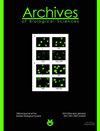补元汤抑制慢性阻塞性肺疾病模型大鼠自噬
IF 0.8
4区 生物学
Q4 BIOLOGY
引用次数: 0
摘要
在治疗慢性阻塞性肺疾病(COPD)方面,人们一直在努力寻找一种副作用更少的更好的治疗方法。本研究探讨补元汤对慢性阻塞性肺病大鼠自噬的影响。通过脂多糖(LPS)注射和香烟烟雾暴露,建立了Sprague-Dawley大鼠实验模型。将大鼠随机分为空白对照组(正常对照组)、实验模型组、比亚迪低剂量组(8.0 g/kg/d)、比亚迪中剂量组(16.0 g/kg/d)、比亚迪高剂量组(32.0 g/kg/d)和3-MA组(6只/组)。苏木精和伊红染色观察细胞和组织形态。透射电镜观察自噬囊泡。Western blotting检测肺组织LC3-II/I、BNIP-1、ATG7、p62、PI3K、p-PI3K蛋白的表达。与实验模型组比较,大鼠肺组织炎症浸润减少,肺上皮细胞细胞核恢复正常,LC3、BNIP1、ATG7、p-PI3K表达显著下调,p62表达显著上调。低剂量组效果最显著(P<0.05,各组均如此)。这些发现表明,BYD在COPD发病机制中抑制自噬的发生,可能是一种潜在的治疗方法。本文章由计算机程序翻译,如有差异,请以英文原文为准。
Buyuan decoction inhibits autophagy in a rat model of chronic obstructive pulmonary disease
Efforts have been made to find a better therapeutic approach with fewer side effects in treating chronic obstructive pulmonary disease (COPD). This study investigated the effect of Buyuan decoction (BYD) on autophagy in COPD rats. An experimental model with Sprague-Dawley rats was established by lipopolysaccharide (LPS) injection and cigarette smoke exposure. Rats were randomly allocated into blank control (normal control), experimental model, low-dose BYD (8.0 g/kg/day), medium-dose BYD (16.0 g/kg/day), high-dose BYD (32.0 g/kg/day) and 3-MA (methyladenine) groups (6 rats/group). Cell and tissue morphology were observed using hematoxylin and eosin staining. Autophagic vesicles were examined with a transmission electron microscope. Protein expression of LC3-II/I, BNIP-1, ATG7, p62, PI3K and p-PI3K in lung tissue was detected by Western blotting. Compared with the experimental model group, the inflammatory infiltrate in lung tissue was reduced, the nuclei of the pulmonary epithelial cells were restored to normal, and the expression of LC3, BNIP1, ATG7 and p-PI3K was significantly downregulated, while p62 expression was significantly upregulated after treatment with the BYD. The effect was most significant in the lowdose BYD group (P<0.05, all groups). These findings suggest that the BYD inhibits the occurrence of autophagy in the pathogenesis of COPD and that it can be a potential treatment.
求助全文
通过发布文献求助,成功后即可免费获取论文全文。
去求助
来源期刊
CiteScore
1.40
自引率
0.00%
发文量
25
审稿时长
3-8 weeks
期刊介绍:
The Archives of Biological Sciences is a multidisciplinary journal that covers original research in a wide range of subjects in life science, including biology, ecology, human biology and biomedical research.
The Archives of Biological Sciences features articles in genetics, botany and zoology (including higher and lower terrestrial and aquatic plants and animals, prokaryote biology, algology, mycology, entomology, etc.); biological systematics; evolution; biochemistry, molecular and cell biology, including all aspects of normal cell functioning, from embryonic to differentiated tissues and in different pathological states; physiology, including chronobiology, thermal biology, cryobiology; radiobiology; neurobiology; immunology, including human immunology; human biology, including the biological basis of specific human pathologies and disease management.

 求助内容:
求助内容: 应助结果提醒方式:
应助结果提醒方式:


